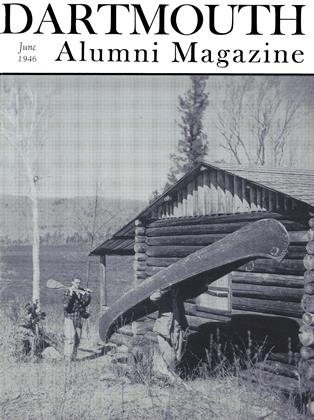by Prof. Eugen Rosenstock-Huessy. Scribner, 1946t 243pages. $2.50.
The Christian Future seems to me a splendid book, crystal clear and with the unanswerable logic of a great poem. It is a book that can't be argued with. Those people whom Emerson speaks of as preferring truth to past apprehensions of truth will welcome it as one of the flagships of our future. This book, better than any other that I know, can admit into the lives and thinking of the returning soldier the main stream of our Christian heritage and give those lives a real future. It is really written for those returning soldiers in whom there is a wistful desire to believe, and a pathetic incapacity to find anything to believe in except an expiring Humanism. They will find The Christian Future the best sword and buckler against the painful cynicism and disillusion that followed the First World War.
Professor Huessy examines the suburb, that soulless flower of our culture, and finds represented there some of the most troubling symptoms of "the modern mind outrun." The atomized, partial life of the suburbanite, whose cellular existence with its lack of community in mind or spirit is best symbolized in the desperate eclecticism of suburban architecture, is examined not with nostalgia for the ideal village life of the nineteenth century but as a challenge to establish real communities for the future. "Our environment today (factory and suburb) is perfect for production and education, and impotent for reproduction and creation," says Huessy. Our task is to rediscover the miracle of reproduction and creation which gives human lineaments to the empty face of undirected energy; this miracle is the future-making miracle of human life.
In pointing the way to a restoration of the Christian future, Huessy shows that this is the only, real future; and in a brilliant discussion of Christianity, he gives an exciting and profound insight into Christ's great triumph in destroying the sterile circles of pagan time and founding a common future for all mankind. The section called The Creation of the Future, beginning with a chapter on the Conquest of Paganism, is the most moving in the book and had for me the impact of revelation.
In The Camping Mind, Huessy calls for the Soldier's Faith. "Peace cannot be organized when the audacity of the soldier is not invited." The audacity and the faith of the soldier that accepts uncertainty and violence and danger as conditions of life and advances into the unknown with determination to shape it to a desired form is merely an intensification of every courageous and creative life. The faith of the soldier must balance the reason of the planners. The Christian Future calls for the soldier to sleep lightly, maintain his faith, and campaign for peace.
 View Full Issue
View Full Issue
More From This Issue
-
 Class Notes
Class Notes1918
June 1946 By ERNEST H. EARLEY, DONALD L. BARR -
 Article
ArticleThe Show Went On In Spite of Wartime Setbacks
June 1946 By HENRY WILLIAMS, -
 Article
ArticleUnited States Foreign Policy and Europe
June 1946 By JOHN C. ADAMS, -
 Article
ArticleA Hard Job of Education A Hard Job of Education
June 1946 By JOHN W. FINCH -
 Article
ArticleThe Truth About China
June 1946 By WING-TSIT CHAN, -
 Article
ArticleRussia and the United States
June 1946 By OLIVER J. FREDERIKSEN '16
Books
-
 Books
BooksShelflife
Mar/Apr 2011 -
 Books
BooksBlack Sheep
March 1977 By HENRY L. TERRIE JR. -
 Books
BooksDEVIL BY THE TAIL
May 1947 By Herbert F. West '22 -
 Books
BooksContradiction
March 1981 By John S. Major -
 Books
BooksDEBRIS.
NOVEMBER 1967 By MARGARET BECK McCALLUM -
 Books
BooksTHE COMMAND OF THE HOWE BROTHERS DURING THE AMERICAN REVOLUTION
June 1936 By Wayne E. Stevens

